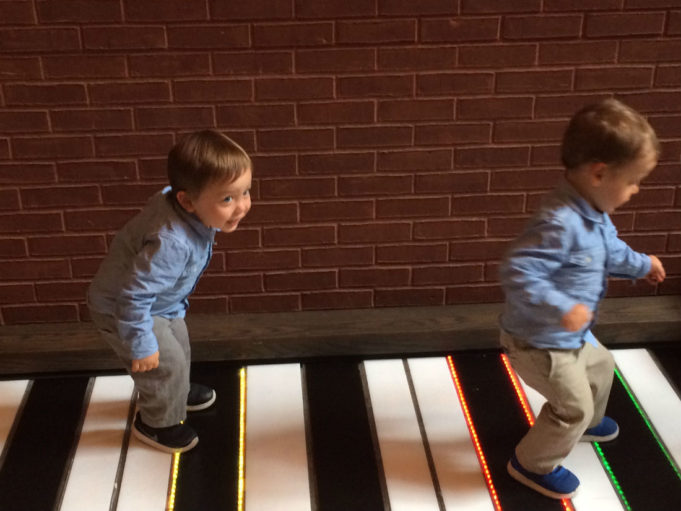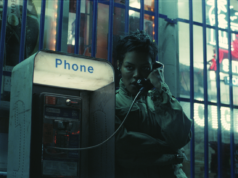The crowd is sparse on Sunday morning, but I don’t think it’s because the warmth of the last few days has given way to rain. After all, the precipitation is so light that it would struggle to be called a drizzle, and the crowd is much heavier during the afternoon, when the rain is likewise heavier. Is everybody at church? Loath to get up early on a Sunday morning during a long weekend? Taking their time over brunch? I don’t know.
The morning session starts with 19-year-old Tony Yike Yang, whose Chinese middle name is pronounced YEE-keh and who received a jury prize during the Cliburn International Junior Piano Competition two years ago. He takes the stage in a shiny black shirt and plays one of my favorite late Beethoven pieces, the 30th Piano Sonata. He gets a little lost during the long, long third movement, but he makes up for it with one of the best performances of Hamelin’s toccata, frenzied but under control. Those qualities also serve him well when he delivers the best of the four Prokofiev Seventh Piano Sonatas we’ve heard so far, taking that last movement at a closer-to-ideal pace and varying his dynamic levels to build tension, instead of treating it like a race. Bright kid.
I’m less impressed with Sunwoo Ye-kwon, who fails to make anything out of Liszt’s transcription of Schubert’s “Litanie auf das Fest Aller Seelen” (“Litany for the Feast of All Souls”) and turns in a pallid version of Rachmaninov’s Second Piano Sonata. One can fairly say that his performance has more feeling than Maximov’s if less construction. That makes it an improvement, but we’re talking about small differences here.
I’m somewhat higher on Chen Han‘s performance here. Taiwan’s representative in this competition dazzles with his takes on Rachmaninov’s Étude-tableau in C-sharp minor (Op. 33, No. 9) and Elliott Carter’s Caténaires. (The title translates as “overhead lines”.) Granted, Carter isn’t the easiest composer to warm up to, but I don’t know why more pianists don’t play his works. Chen does make a tactical error with Liszt’s Réminiscences de Don Juan, as he tries to play it in a restrained, musicianly way. Liszt’s piece isn’t worth that sort of attention, and it’s better served by a pianist who’s willing to wallow in its excesses and show off how fast he can play those alternating octaves.
Yet another South Korean, Kim Hong-gi gives a nice performance of Chopin’s seldom-heard Rondo in E-flat major, though he can’t convince me that this strange piece (which seems like a Frankenstein’s monster of the composer’s scherzos, waltzes, and nocturnes) is worthy of being unearthed. My real beef, though, is with his performance of Gaspard de la Nuit. “Ondine” is supposed to depict powerful waves capable of pulling a man under, and Kim’s registers only gentle ripples. “Le gibet” is meant to depict a maggot-infested dead body hanging in the middle of the road, and Kim makes it sound like something from the waiting room of a particularly cushy funeral home. “Scarbo” is intended to be a mischievous, malicious demon, and Kim makes him sound as dangerous as Cookie Monster. What good is this pianist’s fine technique if he doesn’t understand what he’s playing? His performance actually makes me angry.
A similar lack of adventurousness afflicts Rachel Kudo, who competed in the Cliburn eight years ago under the name Naomi Kudo. The D.C. native of Japanese descent doesn’t lack for power when she’s so inclined, but something seems to hold her back when she plays Barber’s Piano Sonata. Her approach is shown off better in Bach’s French Overture in B minor, which she invests with some pretty colors. That Barber piece looks like an ill-advised choice.
We reach the end of the line with Alyosha Jurinic, though the correct spelling of his name on his website is Aljoša Jurinić, which is the spelling I’ll use. Not many pianists have come from Croatia; the most famous one is Ivo Pogorelich, who came up back when the country was still part of Yugoslavia. Jurinić starts with Debussy’s Rêverie, a piece I spent half a semester in college learning, though I don’t think I played it with the delicacy and lightness of touch that he brings. He also gives a good sense of structure to Beethoven’s 13th Piano Sonata. Jurinić is currently studying at the University of Music Franz Liszt in Weimar, so it would be embarrassing if he didn’t play Liszt well. He makes good use out of the arpeggios and irregular rhythms in the composer’s La Leggierezzan (“the lightness”), but he really shines in the wildly entertaining 11th Hungarian Rhapsody, which begins with the composer instructing the pianist to imitate the traditional Hungarian instrument called the cimbalom. Unlike the other contestants who have played Hungarian Rhapsodies, Jurinić knows how to loosen up with it and brings out the musicality of the lassan (slow section) and the fun of the friska (fast section).
After a deliberation of about 45 minutes, the jury comes back with the following 20 quarterfinalists:
Martin James Bartlett
Sergey Belyavskiy
Kenneth Broberg
Luigi Carroccia
Chen Han
Rachel Cheung
Yury Favorin
Daniel Hsu
Aljoša Jurinić
Kim Da-sol
Kim Hong-gi
Kim Su-yeon
Rachel Kudo
Leonardo Pierdomenico
Ilya Shmukler
Sun Yutong
Sunwoo Ye-kwon
Georgy Tchaidze
Tristan Teo
Tony Yike Yang
I’m surprised that Nikolay Khozyainov doesn’t make it through, but all my favorites survive the cull, as do some who I think shouldn’t be there. We don’t get much rest; the quarterfinals start tomorrow morning, and while I had to evaluate nine pianists per day earlier this round, now I’ll have to cope with 10. What shape will I be in at the end of it? We’ll find out.












